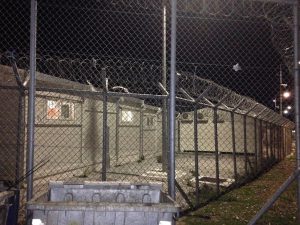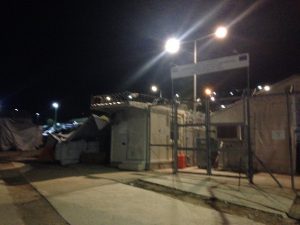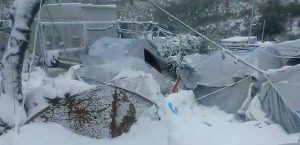Charles Oberg, former director of the Maternal and Child Health MPH Program, recently returned from Lesbos Greece where he helped serve thousands of refugees. Below is a reflection of his experience.
By Charles Oberg, MD, MPH
As President Trump’s proposed U.S. refugee travel ban continues to work its way through the courts, I make a plea for benevolence and tolerance rather than that of fear. I recently returned home from working in the refugee camps on the Greek Island of Lesbos. I was volunteering with the Boat Refugee Foundation, a Netherlands based NGO. I spent the majority of my time in the notorious Moria Refugee Camp. The camp is beyond description and is a surreal mix of an interment camp and shanty squatter community encampment. Based in an old army compound it is defined by the steel gates, high fencing and barb wire from the outside and an amorphous sea of tarps and tents on the inside. The weather had turned brutally cold. Over a foot of snow was followed by freezing rain. The cold and dampness penetrated to the bone. Food queues, inadequate unsanitary toilet facilities and ubiquitous garbage were the norm.
There are over 4500 refugees. They had traveled from Syria, Iraq, Iran, Afghanistan and Pakistan from the Middle East. They came from across the African Continent with families from the Democratic Republic of the Congo (DRC), Ghana, Uganda, Somalia, Eritrea and Sudan. In addition, I treated families from as far east as Bangladesh and west from Haiti and the Dominican Republic.
Almost all had experienced trauma. Some beaten, shot, tortured, and raped and all had experienced the stress of living in unlivable conditions. The complaints were a blur of physical, mental, and spiritual aliments. Yet there was a palpable hope that one-day things would be better with aspirations of a better future. Daily they expressed their gratitude that someone would listen as they shared the story of their journey, affirmed their worth, acknowledged their struggle and celebrated their humanity. You could see it in their eyes and their smiles that each was seeking a better life for themselves and their children. I saw no terrorist. I just saw families, children, men and women-all vulnerable and suffering. So let us remember that our kindness will make us safer than any ban.
Charles N. Oberg, MD, MPH earned his medical degree from the University of Minnesota (UMN) in 1979. In 1984, he completed a pediatrics residency and fellowship at the UMN and his Master of Public Health (MPH) in Maternal and Child Health (MCH). He joined the UMN faculty in 1987, in the Medical School, but is most recognized as a beloved professor, mentor, and scholar in the School of Public Health (SPH), which he joined in 2003. He is also the former director of the MCH MPH Program in the SPH at the UMN. His leadership extends beyond the UMN, ranging from contributions in the Twin Cities community. He is now Professor Emeritus in the UMN SPH and a pediatrician with HCMC. Always an advocate for children, in addition to his scholarly and clinical pursuits, he writes incisive commentaries and provocative essays, like “Lucky,” for scientific and literary journals.


